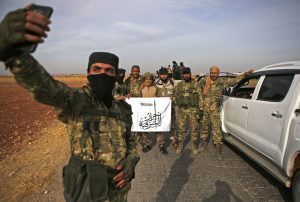
Mohammad Abu al-Saar, a mechanic at a car repair shop in Homs, Syria, was detained and tortured by the country’s ruling regime, like thousands of other protesters, in one of its dungeons. (His name is changed in this article at his request.) The day he was released, he picked up a weapon to seek revenge, guard his city, and usher in a new era of political freedom. It was April 2012, just a year into the rebellion—there was still hope for a positive outcome.
Eight years later, he is a hired gun, fighting in someone else’s war, over 1,200 miles away in Libya. And when he looks across the Libyan battlefield, there’s a good chance that he soon could be facing another Syrian.
Saar is among the Syrian rebels paid by Turkey to fight alongside the forces of the Government of National Accord (GNA), one of the sides claiming power in the protracted Libyan conflict, which began with an uprising against Muammar al-Qaddafi in 2011 and is now a battle for lucrative oil deals and regional influence. The GNA is recognized by the United Nations and backed by the Muslim Brotherhood, a transnational group that propagates political Islam with the support of powerful allies such as Turkey’s President Recep Tayyip Erdogan. Shared allegiance with the Brothers brought Turkey to the interim government’s aid, and its enhanced military support has recently turned the tide of the war in the GNA’s favor.
Saar, however, is just a pair of hands in the broader struggle. A 38-year-old father of four, Saar metamorphosed from a rebel to a mercenary as a consequence of prolonged privations inflicted by unending war in Syria. “My wife and four children live in a tent. I don’t have money to buy cement blocks to build a room for them,” he told Foreign Policy over the phone from Libya. “When my wife gave birth, I didn’t even have money to buy diapers and milk for the baby.”
In 2014, Homs was lost to Bashar al-Assad’s regime forces, and Saar moved with his family to rebel-held Aleppo. There he joined the Sultan Murad Division, a rebel group made up mainly of Syrian Turkmen trained and funded by Turkey. But Turkey’s intentions were not entirely altruistic; it supported the rebels, but it also beckoned them to fight for its own interests.
Saar is an Arab, not a Turkmen, but he chose to join the group to earn a living. In 2018, he was among the rebels hired by Turkey to oust Kurdish militias and hundreds of thousands of civilians from Afrin in northern Syria. (Turkey accuses the Kurdish militias of conducting terrorist attacks inside Turkey and instigating secession.) In Afrin, Saar was paid 450 Turkish liras, a paltry stipend that comes to $46 a month. Libya, however, is a much more profitable assignment. “In my four months in Libya, I have earned more than I did in years of fighting in Syria. I earn $2,000 a month,” he said, sounding relieved at the whopping jump in his income.
Back home in Syria, other former rebels, dealing with the same deprivation, were being enticed to join the same war—but on the side of the commander Khalifa Haftar, the GNA’s main rival backed by Russia, the United Arab Emirates, and Egypt.
As Turkey flooded Libya with its Syrian proxies, it also provided state-of-the-art drones and air defense systems. In March, Russia turned to Syria for reinforcements. It roped in its Syrian ally Assad to back its preferred Libyan warlord and began scouting for men willing to render services in a foreign conflict in exchange for cash.
Syrian rebels say the man tasked with leading this recruitment drive was Col. Alexander Zorin, who in 2016 served as the Russian defense ministry’s envoy at the Geneva-based task force on cessation of hostilities in Syria. Zorin is better known in Syria as “the godfather” of reconciliation deals between the regime and rebels in Ghouta, Daraa, and Quneitra. A Russian source confirmed that in early April, Zorin visited southern Syria, a region believed to be especially fertile ground for Russian recruitment not only due to rampant poverty but also owing to the absence of support from any other regional or global power. Many rebels in the area had already switched their allegiance to Assad in July 2018 after the United States refused them further help.
In cooperation with Assad’s intelligence officials, Zorin is believed to have initiated negotiations with a number of rebel groups to send them to fight in Libya. Abu Tareq (his name has been changed for this article), the leader of a rebel group that fought the Islamic State in Quneitra in southern Syria, told Foreign Policy he met Zorin and agreed to go to Libya along with his fighters. “We met him, and he told us we were going to Libya with the security company [Wagner],” said Tareq from Syria. “He made a generous offer, $5,000 per month for a commander and $1,000 for a fighter. Of course, we agreed, because the financial situation is horrible in our area.” Tareq added that the rebels were enticed not just with monetary inducement but also with amnesty for those who fled the draft and those against whom the regime kept a file for payback later. Abu Jafer Mamtineh, the leader of another rebel group in southern Syria, also proved credulous. He bused out over a hundred young men to be trained by the Russians at a training base in Homs in mid-April.
Ahmad Khatib, an insider with rebel factions in the south, backed Tareq’s account. (His name is changed at his request to protect his identity.) “Col. Zorin’s message was that the former rebels may expand their power and increase the number of their fighters on the condition that they send at least 1,000
